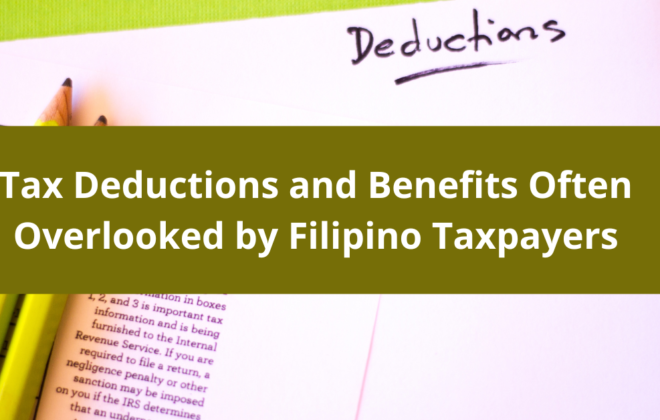Tax Penalties in the Philippines and Ways to Avoid Them
If you are a business owner, it is beneficial to have the basic understanding of the tax penalties that may be imposed on you for non-compliance with tax laws and regulations. The penalties can add up quickly, leaving you with a big tax bill that could hurt your business.
However, with some basic knowledge and diligent planning, you can avoid many of these common penalties.
Common Tax Penalties to Watch Out For:
Late Filing of Tax Return with Tax Due – If you miss the deadline to pay your tax due, the Bureau of Internal Revenue (BIR) may impose a 25% penalty of the amount due, with an interest charge of 20% per annum that will accrue until you pay the tax due.
That 25% penalty is no small thing – on a P100,000 tax bill, that’s an added P25,000 you’d have to pay just for being late. Moreover, there is a compromise penalty for failure to file and/or pay taxes ranging from P1,000 to P50,000 depending on the amount of tax due.
Late filing of Tax Return without Tax due – Not filing required tax returns even if you have no taxes to pay can lead to penalties of P1,000 to P25,000, depending on your gross sales. Those fees can really start to add up, especially for businesses with quarterly or monthly filing requirements.
Incorrect Information on Tax Return – Providing incorrect information on tax returns, whether intentionally or through negligence, can result in a penalty of P1,000 to P25,000 imposed depending on your gross sales.
So, if you underreported your income and get audited later, you could face huge fines on top of the back taxes owed.
Failure to file Certain Information Returns/Late filing of Reports without tax due – Companies may face a penalty not exceeding P1,000 for failure to file returns or late filing of required reports.
Micro and Small taxpayers
In view of the issuance of RR 6-2024, the following are the reduced penalties and charges for micro and small taxpayers.
Micro taxpayers are taxpayers earning an annual gross sale of less than 3 million pesos while small taxpayers refer to businesses earning 3 million to less than 20 million pesos per taxable year.
Failure to File a tax Return with Tax due/ Failure to Pay the Deficiency Tax:
- Civil Penalty – 10% of the tax due amount
- Interest – 6% of the tax due amount
- Compromise Penalty – 50% of the applicable rate or amount of Compromise under “Annex A” of Revenue Memorandum Order 7-2015
Failure to File Certain Information Returns
If a taxpayer neglects to submit any required information, statement, list, or fails to maintain necessary records or provide requested information, a penalty amounting to five hundred pesos per violation, not exceeding twelve thousand five hundred pesos within the same calendar year shall be paid.by the taxpayer.
How to Avoid Costly Penalties:
- Mark Key Dates – Use a calendar (physical or digital) to track all tax deadlines for tax filing and remittance. Set reminders early so you never miss a due date.
- Organize Records – Maintain complete and systematic records of income, expenses, financial transactions, and asset information to ensure accurate tax return preparation each year. Poor record keeping leads to mistakes.
- Declare and Pay your Quarterly Taxes Correctly – For self-employed individuals or those with variable incomes, make quarterly tax payments correctly to stay current and avoid penalties for underpayment.
- Use Authorized Tax Software – Consider using BIR-approved tax preparation software to minimize tax errors. It can serve as a guide as you go through each section of your tax filing.
- Hire a Professional – You can also consider hiring an expert like a Certified Public Accountant (CPA) or tax professional. Good accountants are well versed in the different aspects of Philippine taxation and are updated on any changes in the tax laws. With this, you can have confidence that your tax compliance is done correctly and that appropriate tax reduction strategies have been applied.
- Respond Promptly to BIR Notices – Upon receipt of information about any discrepancies or deficiencies, respond immediately with clarification or payment to minimize possible penalties for failure to respond.
- Set Aside Funds – As part of your financial planning, budget and set aside funds specifically for anticipated taxes so that money will be available when it is due.
The old sayings hold true – an ounce of prevention is worth a pound of cure, and patience is a virtue, especially when it comes to taxes.
Dealing with the BIR and tax compliance may seem like a hassle, but taking a proactive and systematic approach can save you from more headaches and expenses of dealing with avoidable tax penalties down the road. A bit of diligence goes a long way.
Should you need help with tax compliance, our team at DJKA Business Services, Inc is ready to assist you. Just email us at info@djkaaccounting.com
Related Posts
Recent Posts
- New Features and Functionalities of the Online Registration and Update System (ORUS)
- A Comprehensive Guide to Taxation for Freelancers in the Philippines
- New Tax Laws in 2024: What Changes Filipino Taxpayers Should Prepare For
- How to Avoid Common Tax Mistakes in 2024
- Tax Deductions and Benefits Often Overlooked by Filipino Taxpayers





